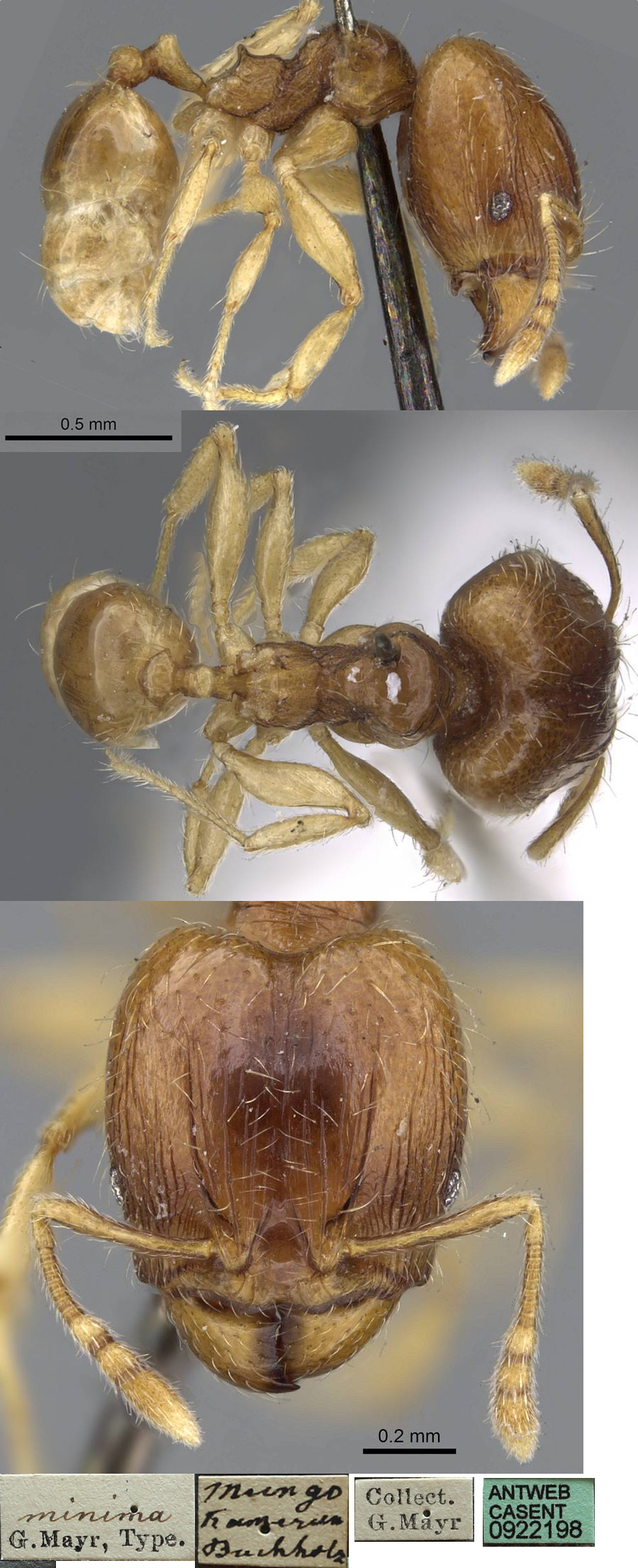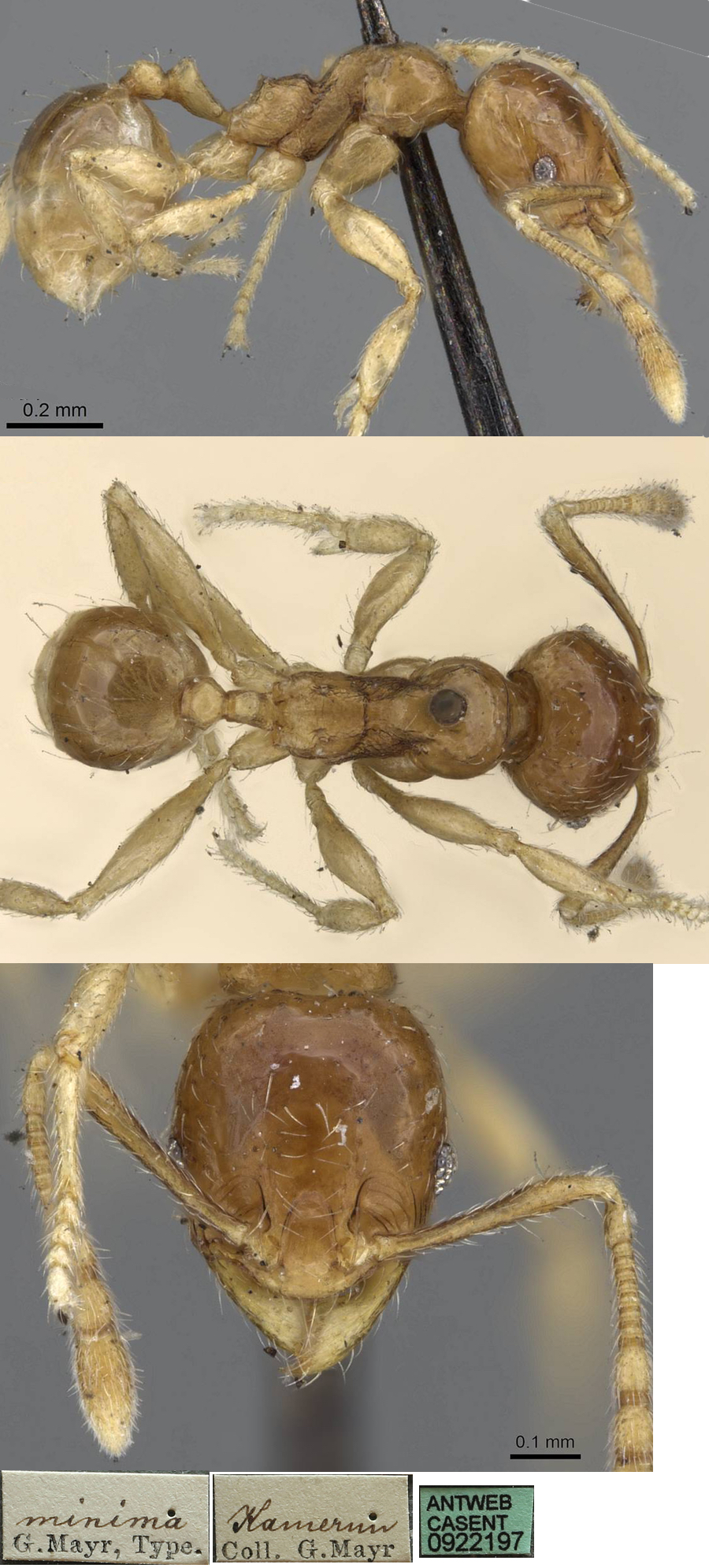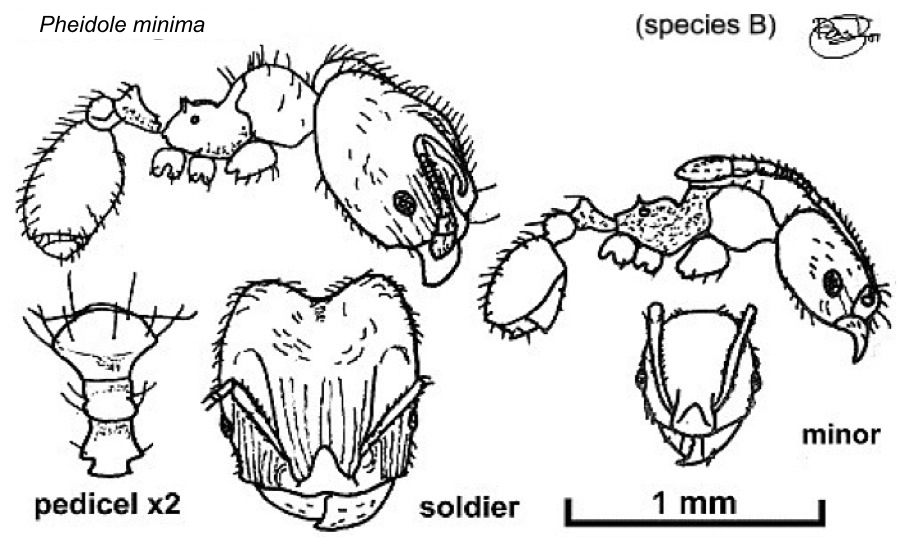Pheidole minima Mayr
  Type location Cameroun
(Pheidole minima nov. spec.,
Mayr, 1901a: 275, major & minor) collected at Mungo-Fluss,
collector R. Buchholz - see below Type location Cameroun
(Pheidole minima nov. spec.,
Mayr, 1901a: 275, major & minor) collected at Mungo-Fluss,
collector R. Buchholz - see below
subspecies
catella (Pheidole
minima Mayr var. catella
n. var., Santschi, 1914d:
339, major & minor) from Nigeria (Olokemeji, collector F.
Silvestri - see linked pages
faurei (Pheidole
minima Mayr stirps Faurei
n. st.., Santschi, 1920b:
15, minor & queen) from Gabon, Samkita , F Faure - see
linked pages
malelana (Pheidole
minima Mayr subspecies malelana
new subspecies, Wheeler,
1922: 133, major & minor, see below) from Zaïre (see
Bolton, 1995) - no images available on Antweb (September 2014)
major, minor and queen described  . .
|
Mayr's (1901a) description is at  . Santschi's (1914d) description of catella
is at . Santschi's (1914d) description of catella
is at  . Santschi's (1920b) description of faurei
is at . Santschi's (1920b) description of faurei
is at  . .
TL major < 4.0 mm, minor ca. 2.0 mm (after Bernard,
1952)
Wheeler (1922) had catella also from Ghana
(Aburi, F. Silvestri). He gave notes on malelana, a very small
species, major TL 2.3 mm and worker TL 1.5 mm; major head as megacephala
in shape but mandibles no longer than broad, distinctly depressed on
the occipitum, see below. Both the major and workers generally seem to
be close to the form listed by me as Pheidole
nigeriensis (species B) except in generally lighter colour. It
was described from a single major and three workers nesting in a stem
of Hyphaene at Malela. The type form colouration was noted as
different, but he did not say in what way; Santschi had noted that catella
was of a colour similar to that now found in malelana but the
description was too brief for Wheeler to be sure of any comparison.
From Guinea, Bernard (1952) the finding of a
major and a worker at Nion crest, Station B6.26, 1300 m; which were
similar to the type form from Nigeria.
|
The Wheeler (1922) description of Pheidole minima
Mayr subspecies malelana was -
MAJOR - Length 2.3 mm. Head shaped much as in P.
megacephala, without the mandibles a little longer than broad,
distinctly but not broadly depressed in the occipital region. Eyes
small, flat, at the anterior third of the head. Clypeus flat,
ecarinate. Frontal area small, impressed; frontal carinae diverging,
reaching to the posterior third of the head, bounding distinct scrobes
for the antennal scapes, which are half as long as the head. Funicular
joints 2 to 8 distinctly broader than long, club longer than the
remainder of the funiculus. Mandibles large and convex, coarsely
bidentate at the tip. Thorax robust, pronotum very convex, with small
but distinct humeral tubercles. Mesonotum falling almost vertically to
the pronounced metanotal constriction, with a slight transverse
convexity in the middle. Propodeum broader than long, concave and
sloping in the middle, its spines rather erect, shorter than the
interval between their bases, with pointed tips. Petiole with rather
high, anteroposteriorly compressed, distinctly emarginate node.
Postpetiole only one and one-half times as broad as the petiole,
broader than long, with the sides angularly produced. Gaster much
smaller than the head, elliptical, convex, with subtruncate anterior
border. Legs stout, femora thickened in the middle.
Shining; mandibles sparsely punctate; clypeus rather smooth in the
middle, indistinctly rugulose on the sides; anterior two-thirds of head
with sharp, but not coarse, longitudinal rugae; occipital lobes with
small, sparse, piligerous punctures. Pronotum and gaster very smooth
and shining; pedicel smooth but less polished; mesonotum and propodeum
opaque, densely punctate. Hairs yellow, sparse, suberect on the body,
short and appressed on the legs and antennal scapes. Colour castaneous;
pronotum, first gastric segment, borders of clypeus, and mandibles
blackish; remainder of mandibles and clypeus, cheeks and anterior
portion of front, petiole and postpetiole yellowish red; legs brownish
yellow; terminal gastric segments pale brown; posterior borders of all
the gastric segments broadly yellowish.
WORKER - Length 1.5 mm. Head subrectangular, as
broad as long and as broad in front as behind, with very feebly convex
sides and nearly straight posterior border. Eyes just in front of the
middle. Mandibles with the entire apical border finely denticulate.
Clypeus convex, with rounded, entire anterior border. Antennal scapes
reaching beyond the posterior corners of the head to a distance equal
to twice their diameter. Thorax shaped much as in the soldier, but the
pronotum narrower and longer. Propodeal spines reduced to minute
slender teeth scarcely longer than broad at their bases. Superior
border of petiolar node straight and entire; postpetiole small, a
little broader than the petiole, subglobular. Pilosity, sculpture, and
colour as in the soldier, but the head smooth and shining, with only
the cheeks delicately longitudinally rugulose.
Described from a single soldier and three workers taken
by Lang from a colony nesting in a stem of Hyphaene at Malela,
Zaïre. This form agrees with the typical minima, in size and in
most of its characters but the colour is very different, the
postpetiole is much narrower in proportion to the petiole in both
soldier and worker; and the antennal scapes of the latter are decidedly
longer.
|
 The
photomontage of the type major worker is
collated
from http://www.antweb.org/specimen.do?name=casent0922198. The
photomontage of the type major worker is
collated
from http://www.antweb.org/specimen.do?name=casent0922198.
|
 The
photomontage of the type
minor worker is
collated
from http://www.antweb.org/specimen.do?name=casent0922197. The
photomontage of the type
minor worker is
collated
from http://www.antweb.org/specimen.do?name=casent0922197.
|

Nigeria specimens (Pheidole species B, in
Taylor, 1980a: 17) [Note - previously on this website as Pheidole nigeriensis]
Major TL 2.43 mm, HL 0.89, HW 0.81, SL 0.42, PW 0.37
Minor TL 1.56 mm, HL 0.44, HW 0.39, SL 0.40, PW 0.22
Colour dark red-brown. Sculpturation slight, faint
spiculation on the lateral mesonotum and propodeum. Erect hairs are
moderately abundant, and are relatively long and fine. In profile, the
petiole node of the major is relatively high and emarginate; the post
petiole node is relatively short with a rounded profile and is produced
laterally to give rounded triangular prominences. The propodeal teeth
are small acute and triangular.
The minor has a petiole which is short
with a raised node but is not produced laterally. From the description
of Pheidole minima ssp
malelana given by Wheeler (1922) this must also be
very close to that form.
In Nigeria it nests in crevices or rot holes on
living trees. Forages on the ground and on native trees. Fairly common
on cocoa, on 1.0% of trees, throughout the cocoa growing area; nesting
in soil and debris in crevices and building debris tents over Homoptera
of all main types. Also found on cashew, oil palm and plantain (Taylor,
1977; Taylor & Adedoyin, 1978).
Also reported from the Mamfe-Mampong cocoa farm in Ghana
by Room (1971), but he collected it only in or cocoa
leaf litter, and it played no part in his report of the ant mosaic.
Found on cocoa at Kade by Majer (1975).
|
|
See specimens below and on the linked majors
and minors pages.
There
is some variation in colour from light to dark brown with location. The
majors have a distinctive conbination of long frontal carinae and quite
short scapes. |
Oxford University Museum
specimens
Pheidole minima
B Taylor det.
|
Cameroun
G Debout & A Dalecky
Cameroon 58a
|
10.iv.2001
EBO
2°33.97' N
9°50.62' E
|
on soil and surface
at sardine oil bait
Major & minors
|
3
|
 |
Pheidole minima
B Taylor det.
|
Cameroun
A Fotso Kuate
Sample 14
|
1.ix.2008
Loum
03°54'30" N
11°25'58" E
|
Major & minor
|
3
|
 |
Pheidole minima
B Taylor det.
|
Congo
Y Braet
|
Brazzaville
4°15'33" S
15°17'5" E |
Hand collection
Major & minor
|
2
|
 |
|
|